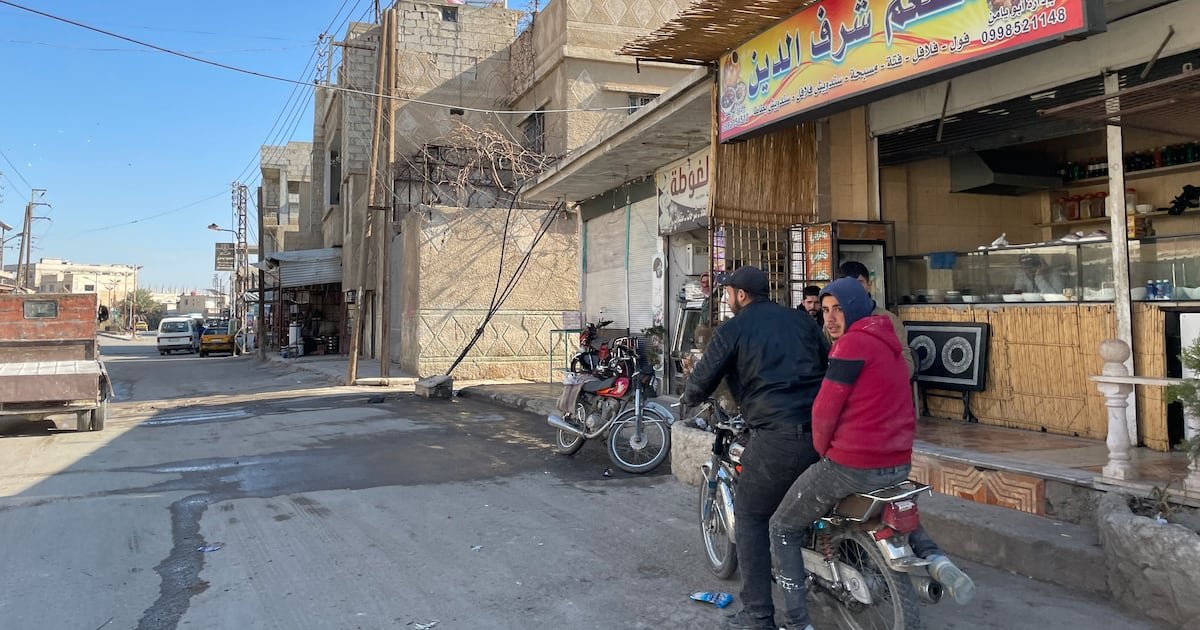Dust and dirt fly off a black Jeep as it speeds over broken pavement in the eastern Ghouta suburbs of Damascus. The man in the front passenger seat, Hayat Tahrir Al Sham operative Abu Amro, is in a hurry.
His mission is to recruit as many young men as possible to the group, which ousted Bashar Al Assad in December with just 20,000 fighters.
HTS, formerly linked with Al Qaeda and Al Nusra Front, is now running a country at the crossroads of the Middle East, having relocated to Damascus from the northern governorate of Idlib. It needs manpower, and fast, especially in outlying areas.
Abu Amro orders the driver to stop at a public square in the former rebel district of Ain Tarma. Vegetable sellers with the new Syrian flag plastered over their vehicles pause to watch the gaunt man with an immaculately trimmed black beard step into a municipal building.
“Do you know suitable people to join us?” Abu Amro asks an Ain Tarma notable. He leaves a phone number and heads to a former regime barracks in the area where new HTS recruits will undergo three-week training.
The extra manpower will help HTS increase its control over Syria. In Ghouta and elsewhere over the last month, the group has been superimposing its own security structures on local governments it already runs, according to members of the organisation and other people working with it.
The tightened grip could undermine hopes for an open society that many Syrians have expressed since HTS ended five decades of dictatorship by the Assad family. Under Bashar Al Assad and his father, Hafez, security was pervasive – official structures could not decide on anything significant without consulting the secret police.
In general, there have been no clampdowns on dissent or secret detentions seen under the previous regime. The country’s new president, HTS leader Ahmad Al Shara, has not made an explicit commitment to a democratic transformation.
Thousands have joined the group since the regime fell, Abu Amro says, with hundreds more expected soon at the barracks in Ghouta. There, he greets school-aged children who have volunteered to clean the compound.
They rip off posters of Mr Al Assad and throw away piles of decrepit uniforms, helmets with broken straps and other worn-out military gear – evidence of the former regime’s decline.
Abu Amro gives instructions to repair the toilets and showers in the barracks. Any other problems, even broken beds, are minor because the recruits will not be staying there for long, he tells the volunteers.
The area’s population is largely rural, poor and religiously conservative, elements that play in HTS’s favour. Ghouta, once described in literature as the Gardens of Damascus, formed a misery belt around the capital after economic and environmental deterioration.
Regime bombing, conventional and unconventional, wiped out whole sections of Ghouta during the civil war. The Barada River, which meanders through the area before disappearing into salty looking farmland, is now a smelly stream. But neighbourhood and clan allegiances remain strong.
Former rebel fighters are returning to the area after having been bussed to north-west Syria under surrender deals in 2018, at the conclusion of three years of siege warfare waged by the regime and its allies Russia and Iran.
Several days ago, hundreds of them took to the streets of the Shabaa district to protest against HTS personnel arresting one of their own. Assurances that the man was only taken in for interrogation as a witness in a drugs case defused the situation. But he was not released, demonstrating the new level of control exerted by HTS in an area that was once a bastion of opposition to Mr Al Assad.
“The HTS does not yet have the numbers to subdue Ghouta, but the people do not want a clash,” says Abu Tareq, a member of a newly formed local council in Ghouta who acts as an interlocutor with HTS.
He has misgivings about its hardline religious ideology, as opposed to the less extreme interpretations of Islam that pervade the capital and its surroundings.
But any improvement to living conditions that the group can bring, even doubling the power supply from one hour a day to two, would win it support, he says.
Abu Tareq was a fighter in Failaq Al Rahman, one of two main rebel brigades in Ghouta, whose members were deported to Idlib in 2018. He secured his current position after obtaining local consensus and then approval from HTS commander Abu Ahmad Al Hilwani, known as the Emir of Ghouta.
HTS has kept the old regime’s eight-district administrative divisions covering Ghouta and the rest of the countryside of Damascus, which officially answer to the Ministry of Interior.
But the “emir” has appointed a local security supremo in each district, called the mousaed al amni, or security assistant, who effectively “runs the show”, Abu Tareq says. The mousaed al amni is answerable to a separate HTS pyramid in each district, called Amn Al Hayat, usually housed in one of the towering security compounds of the old regime.
At one of these compounds last week, people were queuing to register with HTS the cars they had seized after regime operatives abandoned them on December 8, the day Mr Al Assad fell.
“They told me that for now, I am allowed to keep it,” said a former fighter with Failaq Al Rahman, in a Hyundai SUV.
